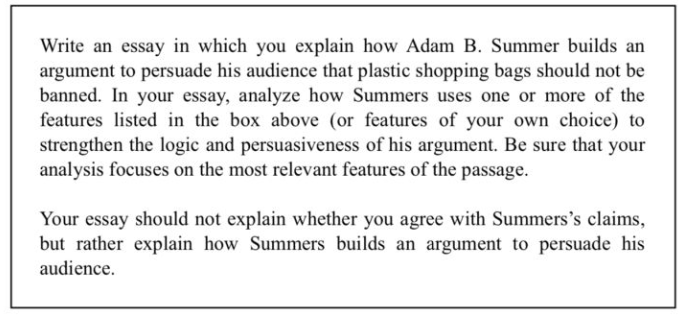SAT写作怎么写出来得分高的开头呢,要注意什么?
俗话说“万事开头难”很多同学在准备SAT、托福的时候,都对开头手无策。于是很多同学对于开头段的处理总是过于普通和一律,譬如在写SAT写作的时候,很多同学开头段开篇就是”In the article, the author claims…”. 这样处理起来虽然简单不浪费时间了,但是相应的分数就会少很多,下面常州sat培训小编给大家介绍一下SAT写作怎么写出来得分高的开头呢,要注意什么?
为什么呢?相信原因大家自己也可以想到,在任何的作文考试中(甚至包括中文的写作考试中),开头的一大忌讳就是过分blunt。而在任何铺垫都没有的情况下,直接叙述作者观点,正是the textbook definition of bluntness。
而开头段是每个考生给考官的印象,就像我们认识一个新朋友一样,往往印象的好坏直接决定了之后关系的发展,那么在作文考试中也是一样,能否写的有文采,能否体现出自己的critical thinking,也直接影响了考官对于我们整个作文水平的判断和最终分数的给出。 那么,既然SAT写作忌讳上来直接陈述文章主题,我们应该怎样写作呢?
其实,虽然SAT写作比较特殊,属于analytical writing,分析性写作,但其文章结构依然遵循议论文写作的基本规则,在开头段,我们需要三个部分的信息:
1. Hook(针对文章主题中的核心词进行铺垫)
2. Thesis(陈述文章作者的观点)
3. Summary(概括之后文中要分析的三大手法—reasoning,evidence, and stylistic elements)
而对于这两个部分,thesis和summary每个考生都是会写的,不管经过培训与否,都可以很自然地依照本能表达出来,并且表达不会太差,因为这两部分模式化很强。而对于部分,很多同学往往没有思路,而这也是正常的,因为在我们最开始从学习写中文议论文的时候,老师就没有系统的教过大家写hook的方法。大家无论写中文作文还是英文作文都总是凭直觉去构思,这样就会出现以下问题:
1. 构思时间过长。
2. 发挥不稳定,比如题目适合自己,就可以构思出很的hook, 如果题目不适合自己,就完全没思路。
那么为了解决这一问题,今天我们就给大家提供一个的hook的方法,叫做popularity, 普遍性描述法。 因为SAT写作中我们所阅读的文章都是作者针对一个他/她所反对的社会现象而给出个人的建议,那么作为文章铺垫的hook部分,我们很显然,可以铺垫一下作者所反对的社会现象产生的过程和普遍性,而在描述完普遍性之后,就可以很自然地接上作者为了解决上述问题,写了某篇文章,陈述了某篇文章的观点。 我们以official guide上的经典文章文章“Bag Ban Bad for Freedom and Environment” 为例:

Californians dodged yet another nanny-state regulation recently when the state Senate narrowly voted down a bill to ban plastic bags statewide, but the reprieve might only be temporary. Not content to tell us how much our toilets can flush or what type of light bulb to use to brighten our homes, some politicians and environmentalists are now focused on deciding for us what kind of container we can use to carry our groceries.
The bill would have prohibited grocery stores and convenience stores with at least $2 million in gross annual sales and 10,000 square feet of retail space from providing single-use plastic or paper bags, although stores would have been allowed to sell recycled paper bags for an unspecified amount. The bill fell just three votes short of passage in the Senate…and Sen. Alex Padilla, D-Los Angeles, who sponsored the measure, has indicated that he would like to bring it up again, so expect this fight to be recycled rather than trashed.
While public debate over plastic bag bans often devolves into emotional pleas to save the planet or preserve marine life (and, believe me, I love sea turtles as much as the next guy), a little reason and perspective is in order.
According to the U.S. Environmental Protection Agency, plastic bags, sacks, and wraps of all kinds (not just grocery bags) make up only about 1.6 percent of all municipal solid waste materials. High-density polyethylene (HDPE) bags, which are the most common kind of plastic grocery bags, make up just 0.3 percent of this total.
The claims that plastic bags are worse for the environment than paper bags or cotton reusable bags are dubious at best. In fact, compared to paper bags, plastic grocery bags produce fewer greenhouse gas emissions, require 70 percent less energy to make, generate 80 percent less waste, and utilise less than 4 percent of the amount of water needed to manufacture them. This makes sense because plastic bags are lighter and take up less space than paper bags.
Reusable bags come with their own set of problems. They, too, have a larger carbon footprint than plastic bags. Even more disconcerting are the findings of several studies that plastic bag bans lead to increased health problems due to food contamination from bacteria that remain in the reusable bags. A November 2012 statistical analysis by University of Pennsylvania law professor Jonathan Klick and George Mason University law professor and economist Joshua D. Wright found that San Francisco’s plastic bag ban in 2007 resulted in a subsequent spike in hospital emergency room visits due to E. coli, salmonella, and campylobacter-related intestinal infectious diseases. The authors conclude that the ban even accounts for several additional deaths in the city each year from such infections.
The description of plastic grocery bags as “single-use” bags is another misnomer. The vast majority of people use them more than once, whether for lining trash bins or picking up after their dogs. (And still other bags are recycled.) Since banning plastic bags also means preventing their additional uses as trash bags and pooper scoopers, one unintended consequence of the plastic bag ban would likely be an increase in plastic bag purchases for these other purposes. This is just what happened in Ireland in 2002 when a 15 Euro cent ($0.20) tax imposed on plastic shopping bags led to a 77 percent increase in the sale of plastic trash can liner bags.
And then there are the economic costs. The plastic bag ban would threaten the roughly 2,000 California jobs in the plastic bag manufacturing and recycling industry, although, as noted in the Irish example above, they might be able to weather the storm if they can successfully switch to producing other types of plastic bags. In addition, taxpayers will have to pony up for the added bureaucracy, and the higher regulatory costs foisted upon bag manufacturers and retailers will ultimately be borne by consumers in the form of price increases.
Notwithstanding the aforementioned reasons why plastic bags are not, in fact, evil incarnate, environmentalists have every right to try to convince people to adopt certain beliefs or lifestyles, but they do not have the right to use government force to compel people to live the way they think best. In a free society, we are able to live our lives as we please, so long as we do not infringe upon the rights of others. That includes the right to make such fundamental decisions as “Paper or plastic?”

此篇文章的主题是作者反对政府将要推行的plastic bag ban,也就是说作者所反对的社会现象就是政府或者环保主义者去推行塑料袋禁止政策。那么我们就可以在介绍作者的thesis和手法前,加入一个popularity描述的hook。
我们可以从原因去思考,为什么诸多政府要推行塑料袋禁止政策?原因可以有很多,想一到两个即可,比如是由于大家对于塑料袋普遍的误解,认为它是环境污染的元凶,或者因为政府或者环保主义者想要给下一代提供一个更好的生存环境,等等。而把原因想出来之后,我们就可以快速构思出这样一个开头段的hook:
In recent decades, especially since the beginning of the new millennium characterized by the skyrocketing severity of environmental problems globally, catalyzed by the majority’s stereotypical belief that the plastic shopping bag is the real culprit of environmental crisis and the government’s profound longing to create a more agreeable living condition for the next generation, it has become a prevalent phenomenon all over the world that policymakers have enacted or are planning to enact strict banning on plastic shopping bags.
以上就是我们根据“普遍性法” 构思出来的一个hook, 写完这句之后,同学们在加上,”Nevertheless, in the article, the author provides a divergent idea that…”是不是觉得很自然很通顺,并且看起来体现了自己的critical thinking呢?
普遍性方法是英文议论文写hook的一个非常基本的方法,不仅在SAT写作中的绝大多数题目可以应用,在托福写作中也可以应用。同学们可以利用上述的方法,套用自己的SAT写作题目来试试看。通过练习,相信每位同学都可以熟练掌握这个方法,并在考场上快速而高端地写好我们的开头段。
常州sat培训小编给大家介绍的SAT写作怎么写出来得分高的开头呢,要注意什么的全部内容就到这里,更多有关sat考试的问题,欢迎咨询常州新航道SAT培训老师。
推荐阅读
- SAT写作基础技巧有哪些?
- SAT写作怎么写出来得分高的开头呢,要注意什么?
- SAT写作分数不高的原因,常州SAT老师分享
- 你必须掌握的8种SAT写作修辞
- SAT写作文章想得高分应该怎么写!
- sat写作实例如何转换
- SAT写作中应避免的几点
【本文标签】:常州sat,常州sat培训,sat培训班,sat写作
【责任编辑】:常州新航道小编 版权所有:转载请注明出处
